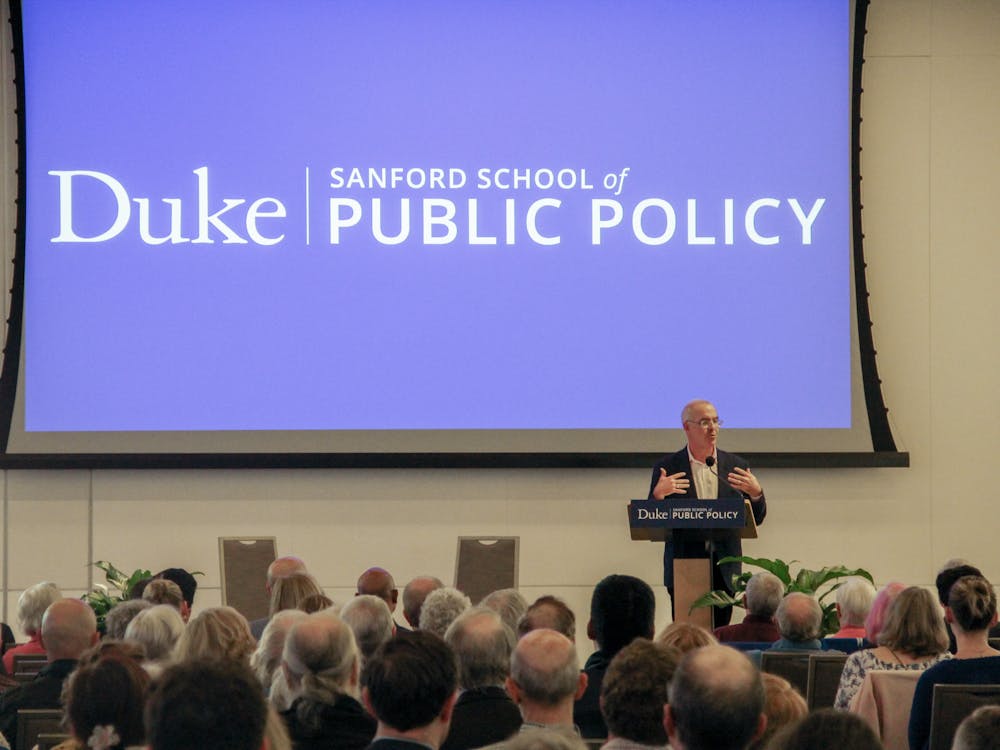New York Times columnist David Brooks visited campus Tuesday to promote his latest book and share insights on forming meaningful human connections in a polarized society.
The event, held in Penn Pavilion, was an installment in the Rubenstein Distinguished Lecture series co-sponsored by the Sanford School of Public Policy, the DeWitt Wallace Center and the Duke Centennial. Brooks spoke about his journey learning to form stronger interpersonal relationships, which he chronicles in his book “How to Know A Person: Bringing Humanity Back from the Brink.”
After the lecture, he was joined by Lisa Borders, Trinity ‘79 and member of the Duke University Board of Trustees and Undergraduate Education Committee, for a moderated Q&A.
Crisis of social well-being
Brooks opened the lecture by discussing his upbringing in a Jewish family, joking that “the culture in [his] home was … Yiddish and British, so super stiff upper lip.” He then spoke about his time as a student at the University of Chicago, which he described as a “very cerebral place,” and his career in journalism, which he noted could be a similarly “solitary” profession.
Brooks reflected on how that background impacted him as an adult, recalling a moment during a baseball game when he caught a player’s bat but reacted in a glum, unexcited manner.
“I look back on that guy and think, show a little joy. And so I've tried to make myself more emotionally available to people, better at social life and intimacy,” Brooks said. “… The sad thing is, as I've been trying to get a little more human, American society has become a little more dehumanized.”
Brooks highlighted recent increases in national rates of depression, feelings of loneliness and despondence as well as a decrease in the amount of trust Americans have in one another.
Referencing Ryan Streeter, executive director at the Civitas Institute, Brooks mentioned how those who are lonely are seven times more likely to be politically engaged and interested in politics.
“They want to find a tribe, and politics gives you the illusion of community: ‘I’m on Team Red,’ ‘I’m on Team Blue,’” he said. “You’re not really in [a] community, you’re just hating the same people … It doesn’t give you a cure to your loneliness, it just enters you into a moral and cultural war.”
He acknowledged that economic inequality, increased use of social media and declines in civic participation all contribute to these rising rates. However, he believes the primary contributing factor is “more direct.”
“For a couple of generations now, we have neglected to teach people the social skills needed to be considerate to people in the complex circumstances of life,” he said.
Brooks pointed to basic skills like active listening and hosting social events as areas where the majority of Americans fall short.
A central point of Brooks’ lecture pertained to mastering the art of being an illuminator, which he defines as a genuine person that makes others feel valued. He contrasted this style of person with diminishers, who are more “incurious” and can rely on stereotypes to form opinions about people with whom they converse.
To make others feel seen, heard and respected is a skill essential to a “healthy school, family [and] nation,” according to Brooks. He said the first step to achieving this is “the gaze,” in which one greets people with a base level of “reverence and respect.” He also emphasized the idea of active listening as an integral part of conversation.
“Treat attention as an on/off switch, not a dimmer,” he said. “If you're going to be tending someone, make it 100% or 0%, [not] 60%.”
Advice for students
During the last 15 minutes of the event, Brooks gave advice to the audience in response to questions from Borders, the moderator.
She asked Brooks to address how individuals can get more comfortable with themselves and their neighbors to form those more meaningful relationships he praised.
He replied that social change begins with “a small group of people who find a better way to live, and [other] people just copy.” These people, Brooks believes, lead lives of “sacrificial love.”
Get The Chronicle straight to your inbox
Sign up for our weekly newsletter. Cancel at any time.
“They love their place, [and] they love their people,” he said.
Advising the many students in attendance, Brooks compared the year after graduation to a “wide open sea with no landmarks.” Along with making an effort to keep in contact with five to 10 close friends from their college years, he suggested that students broaden their scope for bold choices to “widen [their] horizon of risk.”
“The advice I would give about this transition is [to] overinvest in your friendships,” he said. “You're going to need them.”
Aviv Stabinsky is a Trinity first-year and a staff reporter for the news department.

